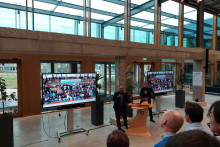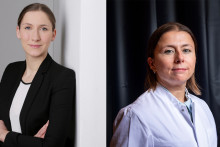This is the content of a letter that Minister of Education, Culture and Science Ingrid van Engelshoven has just sent to the Dutch Parliament. At present, the Dutch language is not sufficiently protected as a language of culture and science, according to the Minister, and she aims to change this.
Not only Dutch students should gain a good command of their native language, but foreign students should also learn Dutch up to a level that is yet to be determined. This would strengthen foreign students’ connection with the Netherlands.
Reputation
Apparently, the standard will not be rigid and institutes of higher education will be involved in discussions on the issue. There will be no national examinations, as from the outset the Minister wants to see ‘customisation and differentiation in specifying the standard’.
However, an initial response from the universities shows that they have some concerns. They say that they can see the importance of improved Dutch language skills, but they fear that the Minister’s plans could have a negative impact on the ‘strong international reputation of our country, including in international academia’.
The universities are also concerned about the Minister’s intention to be stricter regarding the language used in teaching university degree programmes. These programmes should be taught in Dutch in principle, unless there are good reasons to deviate from this, such as the needs of the labour market or the common working language in a particular sector. It is possible that some degree programmes could switch back to the Dutch language as a result, according to the Minister.
Pressure of work
The quality watchdog NVAO (the Dutch-Flemish Accreditation Organisation) will monitor compliance. Higher education institutes are very unhappy about this and are afraid of ‘a strong and unnecessary increase in the pressure of work within the universities’ if they must constantly clarify why they are opting for English-language programmes.
Conversely, student organisations ISO and LSVb are ‘happy’ that universities and universities of applied sciences would have to provide substantive arguments in support of internationalisation. ‘Internationalisation must be about content’ is the heading of their press release.
In one single move, Minister van Engelshoven wants to gain control of the huge influx of foreign students. In 10 years, their number has doubled to some 86,000 students. But how do you limit the number of foreign students without discriminating in terms of country of origin?
To this end, the Minister has enabled the use of a ‘trick’ suggested previously by the universities, which makes it possible to set a numerus clausus for the English-language version of a degree programme, while imposing no limits on the Dutch-language version. In principle, anyone can start the Dutch-language course, but of course foreign students will not do that.
Legal proceedings
Ultimately, the number of foreign students cannot be allowed to grow without limits. Van Engelshoven is therefore taking money away from the recruitment agencies for foreign students that the Dutch government has allowed to be established in some countries.
According to the Minister, it is possible that higher education ‘will no longer be able to cope with this inflow in the longer term’, which could have consequences for the funding of higher education and the access of Dutch students to degree programmes. This comment is not in her letter, but in a press release distributed by her ministry.
Criticism of the influx of foreign students – and the anglicisation of degree programmes – has been growing for years, expressed in particular by the action group Beter Onderwijs Nederland (Better Education in the Netherlands). This group even took legal action against universities in order to force them to offer Dutch-language education.







